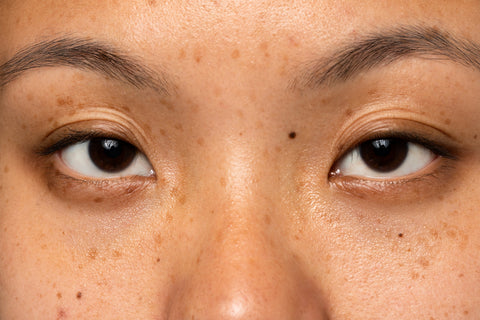Dark spots also known as age spots, liver spots, freckles, sun spots, or black spots are flat dark, brown or black spots. Dark spots can be caused by various factors and can affect people of all skin types and ethnicities.
They vary in size and often appear in areas exposed to the sun, especially on the face, but also on hands and arms. Age spots are most common in adults older than age 40.
Possible Causes
Usually, dark or black spots and patches on the face may be due to over secretion of melanin pigment. The skin cells, called melanocytes, produced excess pigment (melanin) in just some spots instead of uniformly across the skin.
It is believed that this abnormal behaviour of melanocytes is caused by overexposure to the sun or tanning-bed UV rays and the skin’s inability to regenerate after prolonged sun exposure in those selective areas.
According to a study published in the Journal of Investigative Dermatology harmful radiation emitted by TV screens, computer screens, and even uncovered fluorescent lights may cause dark spots on the skin when you expose your skin to this radiation regularly for longer periods of time.
Visible artificial light stimulates pigment production in the same way that UV sunlight does. In order to cope with this factor, try to reduce the time of exposure or at least make sure to take frequent breaks.
However, it is unexplained why not everyone who regularly overexposes skin to the sun or indoor tanning UV rays develops sunspots. Maybe there are some other factors which contribute to this condition such as vitamin and mineral deficiencies, stress, hormones in birth control pills, hormone imbalance, medications, ageing, certain diseases, etc.
Changes in hormones can cause hyperpigmentation and dark spots. This is why pregnant women who develop dark spots often get rid of them without doing anything after they give birth.
A folic acid (folate) deficiency (a diet low in green leafy vegetables) can lead to hyperpigmentation.
Pollution, toxins and harmful chemicals probably also play a role in this condition, especially when the liver and kidneys do not detoxify the body effectively. That is the reason why dark spots are also called liver spots.
Post-Inflammatory Hyperpigmentation (PIH): Inflammatory skin conditions such as acne, eczema, or psoriasis can cause dark spots to develop in areas where the skin has healed after a breakout, injury, or irritation. PIH occurs due to an increase in melanin production as part of the skin's healing response.
As we age, the skin's natural repair mechanisms become less efficient, and accumulated sun exposure over time can result in the formation of age spots or liver spots. These spots commonly appear on areas of the body that are frequently exposed to the sun, such as the face, hands, shoulders, and arms.
Sunspots are harmless and don’t turn into skin cancer. However, skin cancer (melanoma) can mimic a sunspot as common skin cancer types usually start as a flat dark or brown patch.

How to Lighten Dark Spots
After glutathione, Alpha Lipoic Acid is the most important in our cells and is involved in energy production, blood sugar control, brain health, detoxification and therefore also skin health and quality as it will prevent skin cells from being damaged by free radicals.
The body usually makes it but given all the stresses we are under as well as many other factors, we are always deficient.
As I mentioned before, glutathione supplementation has not been proven to be an effective way due to poor absorption and because it has a low ability to accumulate in our brains.
Fortunately, lipoic acid has been shown excellent ability to increase intracellular glutathione levels by about 70%! In addition, it can also regenerate and increase other common antioxidants such as vitamins C and E in our body.
More good news is that lipoic acid is able to chelate iron which tends to be catalysed into very harmful activity by the antibiotic gentamicin. Unfortunately, iron works as a pro-oxidant, which means it can significantly increase harmful free-radical activity. It means that Alpha lipoic acid has the ability to disarm the harmful iron!
There is also evidence that addressing a very common today, due to soil depletion or refined diet, magnesium deficiency can increase glutathione levels, and vice versa, as boosting glutathione can increase magnesium too.
Magnesium is required for the proper functioning of the enzyme gamma-glutamyl transpeptidase which is necessary for the synthesis of Glutathione. The optimum daily intake of good quality magnesium such as magnesium citrate is considered at 400- 800 mg per day.
The best dietary sources of magnesium are greens such as spinach, squash, pumpkin seeds, sunflower seeds, beans, walnuts, almonds and Brazil nuts.
However, due to soil depletion diet alone may not be sufficient today to provide our body with the proper amount of this most important mineral since many other factors that are involved in his problem.
Also, regular vitamin D supplementation, which is necessary today, leads to magnesium deficiency as well.
-
You also need 400mcg of folic acid (folate) as its deficiency (a diet low in green leafy vegetables) can lead to hyperpigmentation.
-
Super Greens powder is my favourite and one of the most powerful natural remedies I know. Take 1 teaspoon of the powder 30 min before breakfast with vegetable juice or water and 1 teaspoon 30 min before lunch.
-
Take supplements containing milk thistle (Silybum marianum), dandelion and artichoke to support detoxification of the skin and help maintain liver function.
-
Consume foods high in omega 3 fatty acids: Ground flax seed, flax oil, soaked in water for at least 30 minutes chia seeds. In addition, take 2000mg a day of good quality molecularly distilled omega-3 fish oil with added antioxidants to prevent oxidation.
-
Zinc citrate (50mg after breakfast).
-
Vitamin D3 (5,000 IU a day). Without adequate vitamin D, your body cannot control infection, in your skin or elsewhere.
-
400 IU of vitamin E taken internally every day may help reduce the appearance of dark spots on the skin. At the same time use vitamin E externally to get much better results: Puncture a vitamin E capsule, squeeze the capsule with vitamin E oil onto your finger and rub the oil onto the dark spots. Repeat the process at least once a day.
-
Include a good probiotic formula to boost good bacteria in your colon.
External Applications
Dark spots can be lightened by the following simple applications:
-
Externally try to use raw organic coconut oil, castor oil and vitamin E oil. Avoid cosmetics with harmful chemicals. Many of today’s skincare products, soaps, shampoos, and cosmetics are nothing more than a toxic mixture of chemicals which cause more skin problems than they solve.
-
Fresh lemon or lime juice is regarded by many as the best natural remedy for removing dark spots on the skin. It is naturally acidic and contains a bleaching agent able to fade the dark spots. Fresh lemon juice contains vitamin C and bioflavonoids that may be effective in lightening dark skin spots.
Put some fresh lemon or lime juice on a cotton ball and rub it on the dark skin patches. As soon as it gets dry wash it off with water. Continue this treatment two times a day for at least two weeks. If you have sensitive skin, you may dilute the lemon juice with distilled or filtered water, rosewater, or Manuka honey.
Note: Some suggest that eating a lemon or an orange shouldn’t cause melasma, but applying citrus products to the skin and then exposing it to the sun can cause a reaction called berloque dermatitis, leading to hyperpigmentation. For this reason, avoid a lemon mask before you are going out in the sun.
Other Recommendations
-
Drink more filtered water between meals (distilled water is the best option).
-
Avoid pro-inflammatory oils, margarine and junk food that contains them. Use raw organic Coconut oil.
-
Avoid sugar, gluten, dairy, stimulants including coffee and tea, alcohol, etc.
-
Try to control stress through stress-relieving exercises such as meditation.
-
Use soaps with charcoal or clay.
-
Exercise. Getting plenty of high-intensity exercise helps your body flush out toxins, including those in your skin’s pores. Plus, exercise is vitally important to all other aspects of your health. If you happen to have access to an infrared sauna, this can be helpful, because the more you sweat the more you flush unwanted debris and contaminants out of your pores.
-
Did you know that a good night’s sleep can decrease your stress and lead to clearer skin? Your body’s time for healing and rebuilding is at night while you sleep, and this applies to your skin. Sleep is also required for good energy and mood.
While dark spots are generally harmless, they can be a cosmetic concern for many individuals. If you are concerned about dark spots on your skin, it is advisable to consult with a dermatologist or healthcare professional.
They can help determine the underlying cause and recommend appropriate treatment options. Treating dark spots may include:
-
Topical Treatments: Over the counter or prescription creams and serums containing specific ingredients, can help lighten dark spots and even out skin tone.
-
Chemical Peels: A dermatologist can perform chemical peels, which involve applying a chemical solution to the skin to exfoliate and remove the top layers, revealing fresher, more evenly pigmented skin.
-
Laser Therapy: Certain laser treatments, can target and break up pigmented cells, leading to a reduction in dark spots.
-
Cryotherapy: This treatment involves freezing the dark spots with liquid nitrogen, causing the treated area to peel off and new, evenly pigmented skin to replace it.
Preventing the formation of dark spots is also crucial. It is essential to protect your skin from sun damage by applying sunscreen with a high SPF, wearing protective clothing and seeking shade during peak sun hours.
Additionally, addressing any underlying skin conditions promptly and avoiding picking or squeezing acne or other skin blemishes can help prevent post-inflammatory hyperpigmentation.
Sources
Images: Image by FreepikAny information or product suggested on this website is not intended to diagnose, treat, cure, or prevent any medical condition. Never disregard medical advice or delay in seeking it because of something you have read on this website. Consult your primary healthcare physician before using any supplements or making any changes to your regime.




